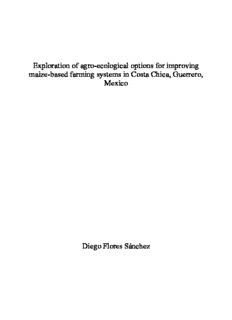
Exploration of agro-ecological options for improving maize-based farming systems in Costa Chica PDF
Preview Exploration of agro-ecological options for improving maize-based farming systems in Costa Chica
Exploration of agro-ecological options for improving maize-based farming systems in Costa Chica, Guerrero, Mexico Diego Flores Sánchez Thesis committee Promotor Prof. dr. M.J. Kropff Professor of Crop and Weed Ecology Wageningen University Co-promotors Dr. ir. W.A.H. Rossing Associate professor, Farming Systems Ecology Group, Wageningen University Dr. ir. E.A. Lantinga Associate professor, Farming Systems Ecology Group, Wageningen University Other members Prof. dr. ir. R. Rabbinge, Wageningen University Prof. dr. E. Hoffland, Wageningen University Prof. dr. S. de Neve,Ghent University, Belgium Prof. dr. ir. O. Oenema, Wageningen University This research was conducted under the auspices of the C.T. de Wit Graduate School for Production Ecology and Resource Conservation Exploration of agro-ecological options for improving maize-based farming systems in Costa Chica, Guerrero, Mexico Diego Flores Sánchez Thesis submitted in fulfillment of the requirements for the degree of doctor at Wageningen University by the authority of the Rector Magnificus Prof.dr. M.J. Kropff, in the presence of the Thesis Committee appointed by the Academic Board to be defended in public on Tuesday 10 September 2013 at 11 a.m. in the Aula. Diego Flores Sánchez Exploration of agro-ecological options for improving maize-based farming systems in Costa Chica, Guerrero, Mexico 215 pages PhD thesis,Wageningen University, Wageningen, NL (2013) With summaries in English, Dutch and Spanish ISBN: 978-94-6173-675-8 To my dear wife Lupita and my handsome son Diego André To the memory of my parents Abstract In the Costa Chica, a region of Southwest Mexico, farming systems are organized in smallholder units. The dominant cropping systems are based on maize (Zea mays L.), either as monocrop or intercropped with roselle (Hibiscus sabdariffa L.). Continuous cropping, and unbalanced fertilizer management systems with an inadequate replenishment of organic matter stocks have caused depletion of soil fertility and low crop yields. This thesis aimed to evaluate alternative cropping systems in terms of their contribution to on-farm productivity and to regeneration of the soil resource base. A set of approaches including farm surveys, on-farm experiments and model-based calculations was applied to characterize farming systems, identify main livelihood constraints and evaluate alternative cropping and farming systems. Main constraints identified were low yields of the major crops maize and roselle, low levels of nitrogen, potassium and soil organic matter, low resource use efficiencies, high production costs, limited marketing opportunities and low prices of products. To address prevailing production constraints, farmer-managed experiments were established in two communities within the region. In on-farm experiments the legumes Canavalia (Canavalia brasiliensis Mart. Ex Benth) and Mucuna (Mucuna pruriens L.var. utilis (Wall ex Wight) Burk) were intercropped in (added to) maize monocrops and maize- roselle mixtures. Intercropping did not decrease maize and roselle yields, and resulted in major reductions of the weed biomass, as well as an increased N uptake by both the food crops and the cropping system as a whole. In nutrient management trials different sources of macro-nutrients were evaluated in maize monocrops and maize-roselle intercrops. The results showed that improvements at field scale are feasible in the short term. Partial replacement of mineral NPK by organic NPK in the form of vermicompost, leading to 10-20% lower total N and K inputs, did not result in lower maize yields or a reduced uptake of N and K. This suggests that the N and K from the vermicompost were utilized better by the maize crop than from the inorganic fertilizers due to lower leaching losses. An experiment on decomposition of and N release from aboveground biomass residues, crop root residues and vermicompost demonstrated that, although the pattern of decomposition varied depending on the type of organic material, most of the N was released within the cropping season. Particularly for vermicompost, only one third of its initial dry mass was decomposed, thus leaving significant amounts of residues for soil organic matter build-up. Model-based explorations were developed to assess the consequences of the experimental results at the field level for whole-farm performance. Results for eight case study farms demonstrated that changes in crop nutrition and animal husbandry can increase farm family income and improve organic matter balances. However, strategies to achieve these goals most effectively were distinct. To maximize family income required Abstract fertilizer-based cropping strategies, while rebuilding soil organic matter required investment in retaining, obtaining and applying sources of organic matter. Farms responded differently to the explored options, highlighting the need for crop nutrition strategies that are adjusted to the soil fertility status of individual fields to be most efficient. The explorations also showed that for six out of the eight farms the minimum family income standard could not be attained. The results imply that the current emphasis in policies to support smallholders by fertilizer subsidies requires adjustment to include promotion of technology development aimed at regeneration of the degraded resource base and to offer off-farm economic options. Keywords: farm diagnosis, farming systems, soil degradation, intercropping, maize, roselle, legumes, nutrient management, vermicompost, crop residues, decomposition, explorations. Table of Contents Chapter 1 General introduction 1 Chapter 2 Diagnosis for ecological intensification of maize-based 21 smallholder farming systems in the Costa Chica, Mexico Chapter 3 Exploring maize-legume intercropping systems in Southwest Mexico 61 Chapter 4 Comparison of organic and inorganic nutrient inputs for productivity enhancement in smallholder maize-based systems in Southwest Mexico 85 Chapter 5 Decomposition and N contribution of aboveground crop residues, crop root residues and vermicompost in maize-based cropping systems in Southwest Mexico 121 Chapter 6 Soil fertility management and crop-livestock interactions as a way out of poverty? Exploration of farm-specific options for a region in Southwest Mexico 139 Chapter 7 General discussion 171 Summary / Samenvatting / Resumen 189 Acknowledgements 200 Curriculum Vitae 203 List of publications 204 Educational certificate of the Graduate School PE&RC 205
Description: